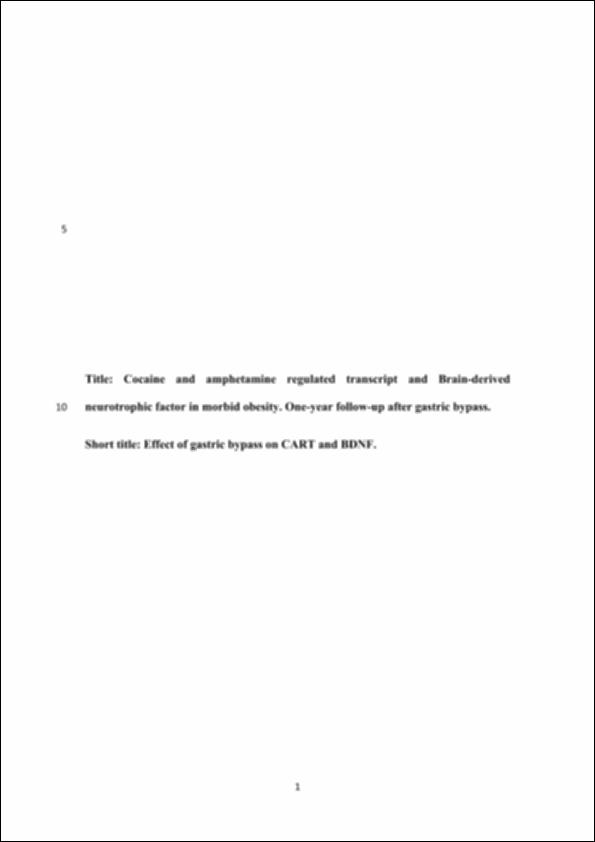Please use this identifier to cite or link to this item:
http://hdl.handle.net/10637/15364Cocaine and amphetamine regulated transcript and brain-derived neurotrophic factor in morbid obesity. One-year follow-up after gastric bypass
| Title: | Cocaine and amphetamine regulated transcript and brain-derived neurotrophic factor in morbid obesity. One-year follow-up after gastric bypass |
| Authors : | Muñoz Rodríguez, José Ramón Agarrado, Andrea Martín Fernández, Jesús Salas, Elisabet González Martín, Carmen Alguacil Merino, Luis Fernando |
| Keywords: | BDNF; CART; Morbid obesity; Obesity biomarkers; Roux-en-y gastric bypass |
| Publisher: | Elsevier |
| Citation: | Muñoz-Rodríguez JR, Agarrado A, Martín-Fernández J, Salas E, González-Martín C, Alguacil LF. Cocaine and amphetamine regulated transcript and brain-derived neurotrophic factor in morbid obesity. One-year follow-up after gastric bypass. Surg Obes Relat Dis. 2018 Nov;14(11):1732-1739. doi: 10.1016/j.soard.2018.07.026. |
| Abstract: | Background: The outcomes of bariatric surgery are very irregular and mostly unpredictable. The search for variables of predictive value is encouraged to help preventing therapeutic failures. Objective: We aimed to confirm the hypothesis that preexisting eating behaviors could predict neuroendocrine and metabolic outcomes of gastric bypass surgery in morbidly obese subjects. Methods: Twenty-one morbidly obese patients from the Bariatric Surgery Program of our hospital were selected according to the specific inclusion and exclusion criteria for this study. The subjects filled out a validated questionnaire to quantify the "loss-of-control" (LC) dimension of food craving and provided serum samples at the onset of the study and 1 year after gastric bypass surgery. Hematological, metabolic, and hormonal variables were studied by conventional clinical tests and enzyme immunoassays and checked for correlations with LC both before and after surgery. Results: Those patients that had exhibited worse eating control at the beginning of the study experienced a better metabolic response 1 year after surgery in terms of reduction of serum insulin, HOMA1-IR, HOMA2-IR, and vitamin D1; all these variables were inversely correlated with presurgical LC. Serum brain-derived neurotrophic factor (BDNF) levels showed the same tendency; in fact, BDNF significantly decreased only in those patients with worse eating control. Conclusions: Problematic eating behaviors may predict a better response of insulin resistance and a specific reduction of serum BDNF in morbidly obese patients after gastric bypass surgery. |
| Description: | Este artículo es la versión aceptada siguiendo la política de la revista |
| URI: | http://hdl.handle.net/10637/15364 |
| Rights : | http://creativecommons.org/licenses/by-nc-nd/4.0/deed.es |
| ISSN: | 1550-7289 |
| Issue Date: | Nov-2018 |
| Center : | Universidad San Pablo-CEU |
| Appears in Collections: | Facultad de Farmacia |
Items in DSpace are protected by copyright, with all rights reserved, unless otherwise indicated.


